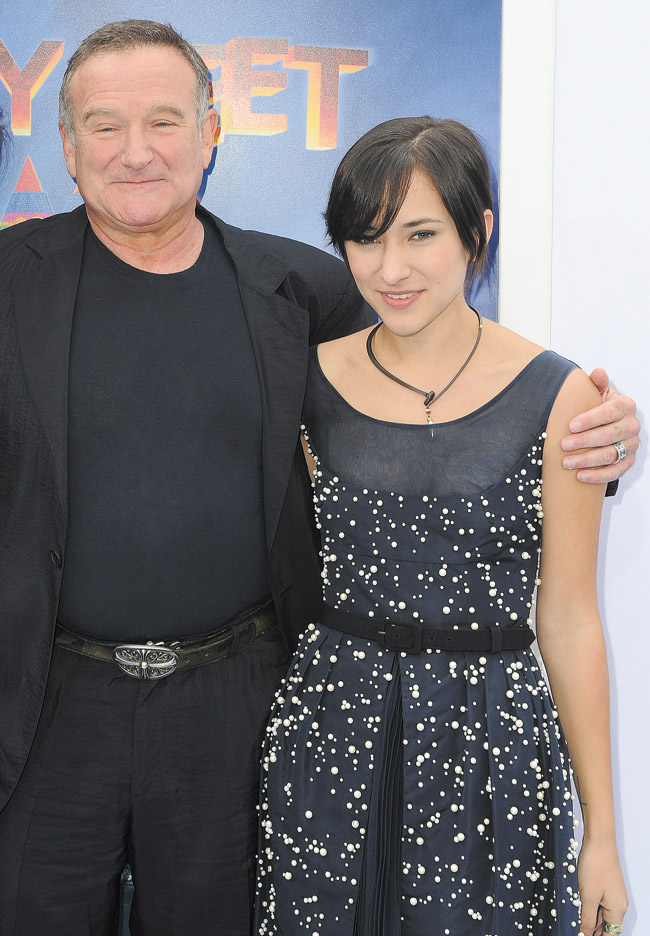Robin Williams, Suicide And Survivors

Actor Robin Williams (left) and his daughter Zelda at the premiere of ‘Happy Feet Two’ in Los Angeles. Williams was pronounced dead at his home in California Monday, Aug. 11. The preliminary investigation showed the cause of death to be a suicide due to asphyxia. AP PHOTO/KATY WINN
There was a picture circulating right after Robin Williams’ death that disturbed me. Williams, in his Genie character, and Aladdin hugging. The caption: “Genie, you’re free.”
No.
Robin Williams is not “free.” He is gone. And it’s permanent.
What’s more, he has left behind loved ones who do not see him as being “free,” just gone. Forever.
I know it is human nature to try to make sense of things we don’t understand. I know people try to romanticize, sentimentalize, soften a tragedy that is so, so hard to bear. But think about the message you’re sending to others who are so depressed they’re thinking of ending it, too.
They’re looking at that and thinking, “Ah, he’s free. And everyone loves him even more. I can be free, too.”
Because that is what they long for and maybe, just maybe, this could give them the “permission” to carry out the act.
Dr. Martin Johnson, founder of Hawaii Center for Psychology, says this is a dangerous time for people who are depressed.
“Whenever there is a widely reported suicide as has been the case with Mr. Williams, there is frequently an increase in the suicide rate. This is thought to be a product of many people who are depressed and having suicidal thoughts being influenced by the act of a famous celebrity.”
Martin says it’s critical to use this time wisely. Encourage people to reach out for help by talking to a mental health professional, or calling the Suicide Prevention Lifeline: 1-800-273-TALK (8255).
Now is the time to think very carefully about what you’re saying and the messages you’re giving. Realize that your words could be very hurtful to others who have the same disease, and to the loved ones fighting to keep them alive.
Let’s turn our attention to the people who hurt the most after a person commits suicide: the survivors.
They’re already asking themselves some terrible questions . They’re dealing with incredible pain.
Recognize, Johnson says, that grieving for a loved one is difficult under any circumstance. In the case of suicide, it can be even worse because of intense survivor guilt. “People often get caught up in the question of why. It’s difficult to accept that often there is no answer to this question.”
That guilt and uncertainty may be the hardest things to accept. Because you’re already asking and asking: What didn’t I see? What could I have done? Why wasn’t I there? Why did I miss the signs? Why couldn’t I stop it from happening?
Martin says it’s better to focus on questions of how. As in, “How do I take care of myself? How do I honor the memory of my loved one? How do I make meaning out of an otherwise senseless act?”
Martin says that after being exposed to “the ultimate form of self-destruction,” it is important to be kind to yourself and to others.
And this, he says, includes allowing for the possibility of feeling angry. Anger is quite common in cases of suicide. “After all, suicide is a form of abandonment.”
Survivors are surprised by these angry feelings, which makes them feel even guiltier.
But Martin stresses that all of your feelings are legitimate and worthy of expression and sharing. Talk with someone you trust, whether it’s a friend, a loved one or a professional.
Now, here’s where we as a society could do better.
We tend to talk and talk about depression and mental health whenever something shocks us — a high-profile suicide, a mass killing. But after the initial shock and grief wear off, we drop the ball. We forget all our good intentions until the next tragic incident.
Martin says we need to do better.
“I recently have started talking about a simple but some might say radical idea that everyone get a mental-health checkup. We should treat psychology like dentistry — we spend time in the chair, some spend more than others, but there is no shame in that. It’s just something we do for our health!”
If you’re depressed and thinking of taking your own life, please call the National Suicide Prevention Lifeline at 1-800-273-TALK (8255).
If you’re hurting because of the suicide of a loved one, please reach out and talk to someone.
The number for the Hawaii Center for Psychology is 538-7793.
The important thing is to get the help you need.
jmoonjones@yahoo.com
Twitter:@JadeMoon1





